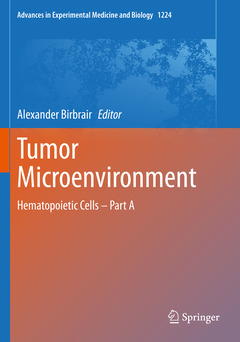Tumor Microenvironment, 1st ed. 2020 Hematopoietic Cells – Part A Advances in Experimental Medicine and Biology Series, Vol. 1224
Coordonnateur : Birbrair Alexander

Revealing essential roles of the tumor microenvironment in cancer progression, this book focuses on the role of hematopoietic components of the tumor microenvironment. Further, it teaches readers about the roles of distinct constituents of the tumor microenvironment and how they affect cancer development. Topics include neutrophils, basophils, T helper cells, cytotoxic lymphocytes, fibrocytes, and myeloid-derived suppressor cells, and more.
Taken alongside its companion volumes, these books update us on what we know about various aspects of the tumor microenvironment as well as future directions. Tumor Microenvironment: Hematopoietic Cells ? Part A is essential reading for advanced cell biology and cancer biology students as well as researchers seeking an update on research in the tumor microenvironment.
Neutrophils in the Tumor Microenvironment.- Basophils in Tumor Microenvironment and Surroundings.- Janus or Hydra: The many faces of T helper cells in the human tumour microenvironment.- Cytotoxic CD8+ lymphocytes in the tumor microenvironment.- Mucosal-associated invariant T cells in tumors of epithelial origin.- Fibrocytes in the Tumor Microenvironment.- Models for Monocytic Cells in the Tumor Microenvironment.- Myeloid-Derived Suppressor Cells in the Tumor Microenvironment.- Index.
Alexander Birbrair received his Bachelor’s Biomedical degree from Santa Cruz State University in Brazil. He moved to North Carolina, where he finished his PhD in Neuroscience under the mentorship of Osvaldo Delbono. Then, he joined as a posdoc in Stem Cell Biology at Paul Frenette’s laboratory at Albert Einstein School of Medicine. In 2016, he was appointed faculty at Federal University of Minas Gerais in Brazil, where he started his own lab. His laboratory is interested in understanding how the cellular components of different tissues function and control disease progression. His group explores the roles of specific cell populations in the tissue microenvironment by using state-of-the-art techniques. His research is funded by the Serrapilheira Institute, CNPq, CAPES, and FAPEMIG. In 2018, Alexander was elected affiliate member of the Brazilian Academy of Sciences (ABC), and, in 2019, he was elected member of the Global Young Academy (GYA).
Date de parution : 02-2021
Ouvrage de 146 p.
17.8x25.4 cm
Date de parution : 02-2020
Ouvrage de 146 p.
17.8x25.4 cm



